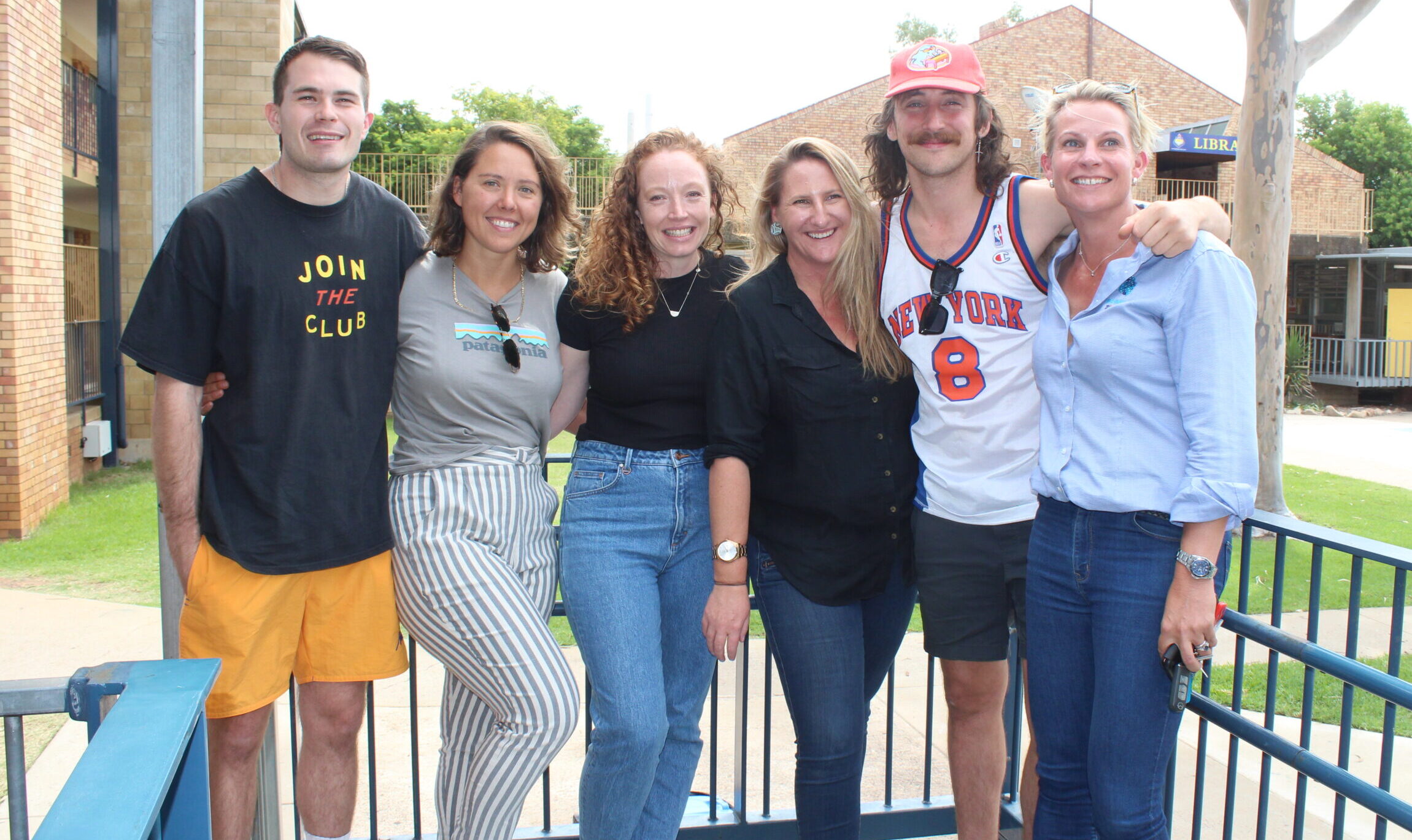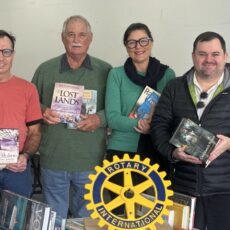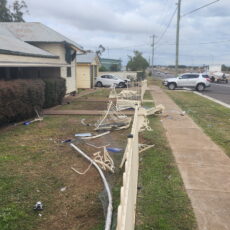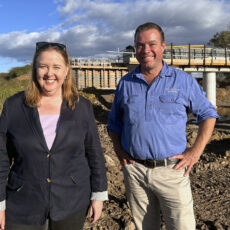Living in rural Australia means adapting to life-threatening weather conditions including droughts, bush fires, and even floods.
So many of us living in the Narrabri Shire have learnt to show strength in all kinds of adverse circumstances, and put on a brave face in the wake of devastation.
Too often, we keep our problems to ourselves in a bid to maintain this resilient exterior.
But is this the best approach?
Letitia Cross, Rural Adversity Mental Health Program coordinator, doesn’t think so. She wants to see a culture shift surrounding those difficult conversations.
With her help, RAMHP and Highway to Well have teamed up with local partners including Gotcha4Life, Tomorrow Man/Woman, and a range of Narrabri-based service organisations to bring the Tough Enough mental health movement to local people of all ages.
The program has been touring in the local area this month, redefining what it means to be courageous.
It aims to improve our understanding of mental health problems, reduce stigma around asking for help, and create a positive culture that looks at proactively managing our psyche.
The local reception to the program has been astounding, with positive feedback all around.
“I’m so proud of the way our community has stepped up and made an active effort to get engaged with this sometimes challenging content,” Miss Cross said.
One group that particularly enjoyed their experience was the Year 11 students of Narrabri High School.
Last Thursday they took part in mental wellness exercises run by Melbourne-based groups, Tomorrow Man and Tomorrow Woman.
The workshops, which were broken up into males (Tomorrow Man) and females (Tomorrow Woman), looked at traditional stereotypes around gender and mental health and challenged the students to be honest and open about their own experiences on the subject.
Students Holli Nipperess and Lana Parkes said their favourite part of the workshop was the ‘line game’, an interactive exercise which asked the girls to each take a step toward a line on the floor if they agreed with the statement put forward.
“One prompt said to move forward if you’ve ever battled with mental health issues, and I was so surprised to see how many girls took the step,” Ms Parkes said.
“It really made me realise that this is normal, and I’m not the only one struggling at times.”
Ms Nipperess agreed, saying that being honest about mental health helped ease the burden.
“I was able to share things with people that I haven’t opened up to before, and I was amazed to find it didn’t feel awkward or weird because everyone was in the same boat,” she said.
The boys played their own version of the ‘line game’ in their Tomorrow Man class.
They were shocked to learn that they had broken traditional masculine stereotypes, especially around maintaining a tough exterior and refusing to show emotion.
“We told the boys to take a step if they’d cried in their lives, and every one of them stepped forward, proving that it’s perfectly normal to cry,” explained one of the Tomorrow Man facilitators.
“Then we asked them to step forward if they’d cried in the last 12 months, and about 95 per cent of them took another step.
“The boys then shared why it helps to get it off your chest, shattering those myths around what it means to be a brave man.”
The students found that the modern approach the program took, with vibrant, relatable presenters sharing their lived experience, made the workshop much more engaging.
“We probably went in there too narrow-minded, worried it would be disconnected and boring, but that certainly wasn’t the case,” Ms Parkes explained.
“I think some of the generations before us haven’t always been taught the best way to approach mental health, so it’s often seen as a taboo subject – but
Tomorrow Woman offered a refreshing new take on the subject, with the hosts sharing their own stories and encouraging us to connect,” Ms Nipperess agreed.
A similar approach was taken in the Tomorrow Man group, in which the boys were encouraged to share their experiences on tough subjects including grief and internalised misogyny.
Tapping into their authentic voice, and sharing truthfully with one another, helped the participants empathise with their fellow students.
“It just made me realise that you never really know what’s going on behind closed doors, and you don’t always know if someone is struggling unless you know the signs to look for,” Ms Nipperess said.
“It makes you realise that you’re not alone.”
The girls also said they predict some new friendships to bloom from the experience, and they aren’t the only local women to say so.
The Namoi Women’s Shed is another group that took part in the Tomorrow Woman workshop, with great success.
Rachael Anderson, acting campus coordinator for Community College Northern Inland, said the event was the perfect addition to the 2021 NSW Women’s Week.
She believes that, in a time where the definition of “woman” is expanding and evolving, workshops like this aim to help woman reignite their voice.
“It empowers women to confidently express their needs and opinions, in the moments that matter to them,” Mrs Anderson said.
She said that the Tomorrow Woman event created a space free from judgement, allowing local participants to “rise above the noise and see their true selves”.
Mrs Anderson was thrilled with the experience and said her fellow participants all had a great time too.
“The feedback has been both heartfelt and inspiring, we hope that we have provided these amazing women with the knowledge to practice courage and cultivate a strong voice,” she said.
One important area that Mrs Anderson said the event touched on, is the mental health services available to local women.
“I’ve found that many local people don’t know where to go for support,” she said.
“Or worse yet, they refuse to look into those support services for fear of judgement – I’m pleased Tomorrow Woman discredited some of the stigma attached to seeking help.”
Mrs Anderson said the workshop helped assure local women that they aren’t alone in their mental health struggles and that it’s okay to speak up.
“We’re all time poor and most of us feel like we’re failing on a constant basis – as women, as mothers, as daughters,” she said.
“But, when you open up to others, you find that everyone feels this way at some point.
“You realise that you don’t have to be happy all the time, and it’s okay to feel down, but it certainly helps to have a conversation and share the weight of those emotions.”
Abbey Fraser and Anita Zuscak – the Tomorrow Woman presenters – and Ryder Jack and Jarrad Asquith – who hosted Tomorrow Man – were all too happy to talk further on their programs.
They explained that the workshops were essentially born from Gus Worland’s Man Up docuseries.
The media star himself visited Narrabri today month too, as part of the Tough Enough campaign.
The team explained that soon after Tomorrow Man started up, the need for a female-equivalent program became apparent, so Tomorrow Woman quickly followed.
While Tomorrow Woman encourages women to speak up and challenge ideas around bravery, Tomorrow Man looks at breaking traditional stereotypes by sharing stories and disproving myths around being tough.
“We go into male-dominant environments, exploring the current state of masculinity – what’s working for blokes, what isn’t working, and what the men of tomorrow look like,” Mr Jack explained.
“By getting these men to open up in front of one another, they’re breaking those manliness myths on their own.
“They come into the exercise thinking strong men are vaults that don’t share anything, but they leave knowing that being honest and speaking from the heart is truly one of the gutsiest things you can do.”
The facilitators made it clear that the program doesn’t try to offer a one-size-fits-all solution for every class.
“We don’t give them the answers,” Mr Jack explained.
“We ask questions and provide the participants with a safe environment, so they feel comfortable to have those tough conversations.”
He says the program hopes to encourage more flexibility surrounding engrained gender stereotypes because “things need to change”.
“We’re losing seven men a day to suicide, the number of mental health and domestic abuse problems is on the rise, and young boys are learning to express emotion through anger,” Mr Jack said.
“So, Letitia Cross, who’s very passionate about her community, has brought us here for a week to work with a whole range of local groups and people to break down some of the stigma attached to conversations around mental health.”
Mr Jack also spoke on the difference between the workshop participants, geographically.
“Wherever we go in Australia, the male stereotypes are always the same.
“But there is certainly a difference between the country and city people partaking in the classes.
“Coming out to regional towns, we need to be very careful because these communities do need strong, resilient people to help hold the town up when things beyond their control happen, like floods and droughts,” he said.
“But we also need to encourage those men to have the important, tough conversations, and ask for help when they need it.”
“The suicide rates are far more overrepresented in regional areas, so we need to help rural people understand that there’s no weakness in being vulnerable.
“We don’t want to keep seeing men take their own lives instead of speaking up,” Mr Jack said.
He explained that the Tomorrow Man program acts as “a kind of stepping stone” to local mental health services, telling men that it’s okay to seek help.
And that approach is mirrored in the Tomorrow Woman workshops, too.
“For girls, there’s a lot of noise around how to dress, act and speak.
“That often leaves them with a lot of confusion, with no idea who they’re supposed to be, and we want to help them through that journey,” Ms Fraser said.
“One of the most powerful things that comes out of the Tomorrow Woman workshops is that everyone learns that all people go through tough times, so we need to be talking about it.
“My favourite thing about the class is getting participants from all ages into a room together – from the youngest girls in their teens, right through to women in their 80s and 90s – and talking, sharing and relating to one another.”
Ms Fraser also explained that the female-focused classes “encourage girls to prioritise bravery over perfection”, in hopes of shattering outdated expectations that no longer serve the women of today.
“We also explore history – or herstory, as we call it – to find out where these social pressures come from.
“And, once the girls are aware of these external judgements, they can recognise and speak out against them in real life,” Ms Fraser said.
“Once girls are confident enough to talk to other girls about these subjects, and guys are comfortable sharing with other guys, they can then come together and chat about it all with one another as a united community,” Mr Ryder explained.
The Tomorrow Man and Tomorrow Woman teams are excited to have made their mark on the town, but say their work is far from done.
“This week, we’ve been able to coach the women of Narrabri through the first of three modules,” Ms Fraser explained.
“But we’re hoping to keep coming back to Narrabri, continuing to build on the skills we’ve taught everyone here, and we plan to eventually get to a point where we don’t need to come back,” Mr Jack said.
“We’ll train a few passionate Narrabri people to be basic facilitators, locals with big hearts who want to help, and the teachings will continue throughout the community even after we’re gone.”
Ms Cross agreed, saying she hopes to bring the facilitators back sometime in the future.
“We’d love to welcome the Tomorrow Man and Tomorrow Woman teams back to Narrabri, to continue teaching the program, provided we can rally enough local support,” she said.
The team is enthusiastic to make its return to the country, saying it loved the time spent in the town.
“We’ve just felt so welcomed here, to a place we’ve never been before,” Mr Jack said.
“We stand out a bit, being from the city, but every shop we walk in to, every restaurant and café we’ve visited, everyone is just so friendly.
“We love the sustained, continual learning process, involving the whole community – our team all hate the fly in/fly out approach, so we’re really looking forward to coming back to this beautiful town.”
To order photos from this page click here








